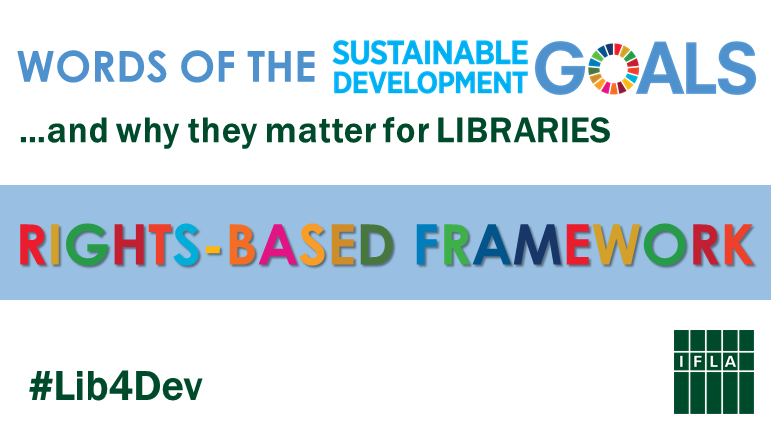As the 2018 High Level Political Forum moved towards its conclusion, the focus was more and more on the language in the Ministerial declaration.
The choice (or exclusion) of specific words or terms can seem arcane, but it is a powerful indicator of the model of development that the world’s governments are looking to achieve.

One of the most political concepts was that of a ‘rights-based’ framework. This – and what it means for libraries – is the subject of this blog.

What Does a Rights-Based Framework Mean?
The rights referred to are human rights – not just those set out in the 1948 Universal Declaration, but also the ones which have been defined subsequently. These include the rights of the child, the right to food, or the rights set out in the International Convention on Economic, Social and Cultural Rights.
The rights-based framework brings with it a number of the principles associated with human rights in general – indivisibility (you cannot prioritise or pick and choose among rights), interrelatedness (that they overlap and are connected), interdependence (the achievement of one depends on the achievement of others) and universality (everyone benefits).
Moreover, they underline that individuals are rightholders, and entitled to rights. In turn, governments, the international community, NGOs, businesses, and other human beings should respect and promote them. In some cases – in particular where they have been adopted by specific additional measures – these rights are legally enforceable, although this is not the case for all rights, in all countries.
Rights-Based as Opposed to…?
The key moment for the application of these rights to development came in 1986, with the agreement on the Declaration on the Right to Development, agreed by the UN General Assembly. This marked a turning point away from a model focused rather on promoting economic growth, with relatively little regard to the fate of individuals or problems within societies.
It can also be characterised as a deal, with richer states accepting a responsibility to help poorer ones deliver development for their citizens. Developing states in turn accepted an obligation to defend all the human rights (both civil and political, and economic, social and cultural) of their citizens.
This is not a tension that has gone away. Just as some argue that fundamental freedoms (civil and political rights such as freedom of expression, association and religion) are essential for a healthy and prosperous society, others suggest that it is more important to focus on economic and social wellbeing, regardless of limitations on freedom.
By adopting a human-rights based approach, the United Nations made an important step both towards reaffirming the responsibility of the world as a whole to deliver development for all, but also underlining that economic and social progress cannot come at the expense of fundamental freedoms.
Moreover, it sets the achievement of rights as the final goal against which governments will be held accountable. Simply delivering programmes is not enough – there has to be meaningful change. And finally, by referring to human rights, it adds a new political strength to the agenda.
The Link with Libraries
The action of libraries itself can be seen as a way of making of a rights-based framework for development happen. As institutions focused on delivering a number of key individual rights (to access to information, to participate in cultural life, to education), they are a key part of the infrastructure for making good on governments’ commitments.
Often working with a mandate to reach out, in particular, to marginalised groups, they regularly make the additional effort necessary to ensure the rights of those who might not otherwise benefit.
The work of libraries focused on people with special needs, those based in less favoured areas, and those providing Internet access to people without other means of connecting are just some examples. Through this access, they allow for the realisation of broader economic and social rights.
Finally, the rights based approach also supports many of the broader advocacy arguments made by libraries, such as the importance of privacy and freedom of expression.
The concept of a rights-based framework can therefore be a very useful tool in library advocacy. Individuals have a right to information, to education, to culture and to science, and libraries deliver these. Moreover, as a demonstrator of the interrelation between fundamental freedoms (such as the of access to information) and economic social and cultural rights, they provide a great example of the principles of the rights-based approach in action.
Further reading:
- Office for the High Commission for Human Rights, Guide to the Right to Development
- Danish Human Rights Commission, Human Rights in the SDGs
- Nyamu-Musembi, Celestine, and Cornwall, Andrea (2004), What is the “rights-based approach” all about? Perspectives from international development agencies, IDS Working Paper 234
- Winkler, Inga T., Williams, Carmel (2017), The Sustainable Development Goals and human rights: a critical early review, The International Journal of Human Rights, vol. 21, no. 8, 1023–1028